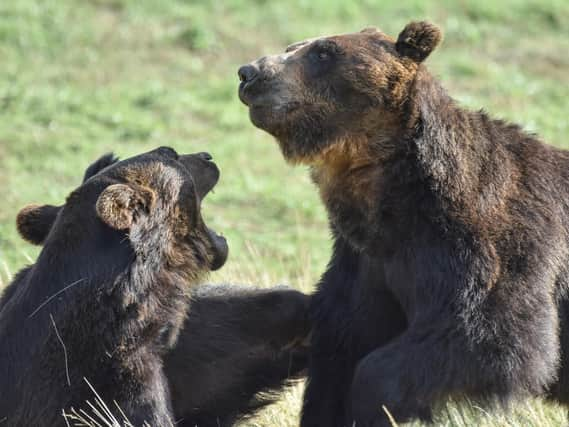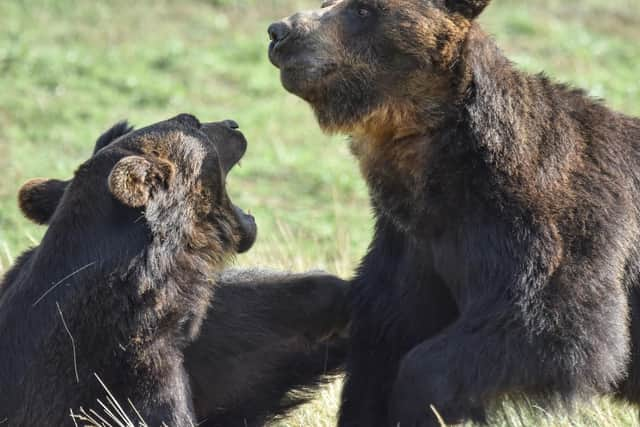VIDEO: Rescued bears kept in 6ft x 9ft cages in Japan looking forward to Christmas in Doncaster


The three Ussuri Brown Bears, who came to the award-winning park in the summer, have been regaining their strength and mobility thanks to the care of staff and a team of vets.


Kai, Riku and Hanako, who were kept in cages measuring 6ft by 9ft for most of their lives in Japan, are now enjoying life in their purpose- built Rescue and Rehabilitation Reserve at Yorkshire Wildlife Park.
Advertisement
Hide AdAdvertisement
Hide AdThe reserves of just under 4 acres include plunge pools and a lake and a range of climbing and play equipment designed to withstand the bears' attention.
After 5 months at the Park, Kai and Riku have undergone a health check to see how they are progressing.
When the bears arrived, the park's vets confirmed that the bears, who are an at-risk species, were underweight and malnourished, had dental problems and were suffering from joint and limb problems because of the limited space at their former home.
Their condition and body mass has improved since they have built their strength and muscle by swimming and climbing, but they still have chronic problems with their joints from their time in Japan.
Advertisement
Hide AdAdvertisement
Hide AdVets from Portland House Veterinary Services, in Retford, and Nupsla Veterinary Services have been working with the YWP team on an ongoing basis to look for solutions to help improve the bears' health and mobility.
The two 17 year old male bears Kai and Riku, who coped well with their 5,400-mile journey from Japan, have been given joint injections with a new product which will offer relief from osteoarthritis believed to have been caused by lack of activity due to the confined facilities in their early years.
'They are doing well in their new home and our staff are making sure they can enjoy life at YWP,' said Debbie Porter, Animal Manager at the park near Doncaster who travelled out to Japan to help move the bears in August. Â 'They are a beautiful but at-risk species and we are delighted to playing an important role in their conservation. The help we have had from other organisations and vets demonstrates how keen everyone is to help these bears. Hannako, Kai and Riku all showed chronic stereotypic behaviour when they arrived due to the deprived environment they had come from. Behaviours included spinning on the spot and pacing heavily in a small space. Through the provision of a varied and nutritionally complete feeding regime, provision of enrichment and commitment from the carnivore team, the occurrence of these stereotypic behaviours has dropped significantly.
The bears' general condition has improved hugely since they arrived, they have gained weight and muscle '“ increasing in weight by an estimated 30kg which is amazing. They adapted to their new surroundings really well, they are very bright and inquisitive and now they have the right space and environment, they are behaving like proper bears! Kai and Riku are now together in their reserve after living in adjacent tiny cages for 17 years and it is a delight to see them playing together.
FOR MORE: Click here
Advertisement
Hide AdAdvertisement
Hide Ad`It's their first Christmas at the Park and no doubt they will be spoilt with some extra treats '“ but the best present for all of us who look after them, is to see them looking so happy and well '“ their faces and expression have changed completely, they have glossy, thick winter coats and they are looking strong and with definite muscles where once they were wasted and weak. It is incredible how they have changed in a short space of time.'Â
The Ainu Cultural Museum, on Hokkaido, realised it did not have the knowledge or the facilities to care for the bears and chose Yorkshire Wildlife Park as their new home because of its expertise in welfare and rehabilitation.Â
Ussuri bears are on the IUCN Red List of Threatened Species due to their vulnerability to habitat loss, illegal hunting for body parts and skins. They live in forests from coastal to mountain regions but the bears are extinct across parts of Asia and there are thought to be 10,000 left in Japan.Â